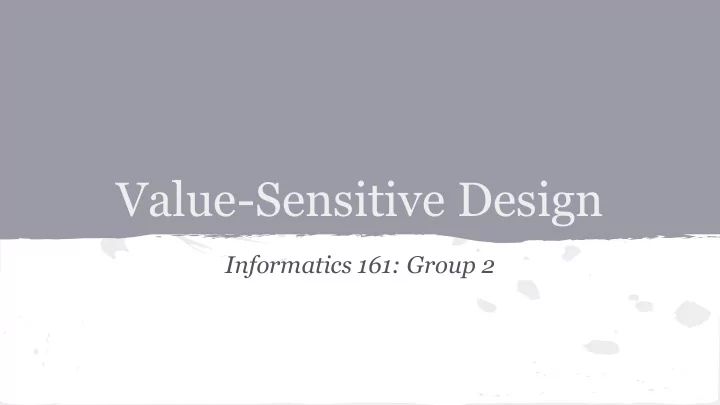

Value-Sensitive Design Informatics 161: Group 2
Overview ● What is Value Sensitive Design (VSD)? ● Definition of values HUSH ● Tripartite Methodology ○ Conceptual HORIZON ○ Empirical ○ Technical
What is VSD? ● Design approach that keeps human values at the forefront of the design process Conceptual Empirical Tripartite Methodology Technical
What values? “what a person or a group of people consider important in life” e.g. privacy, ownership and property, physical welfare, freedom from bias, universal usability, autonomy, informed consent, trust or nice manners, art, morning tea, friendship etc.
Conceptual Investigations ● Identifying & understanding stakeholders ○ their values ○ values conflicts that might arise for these stakeholders through the use of the technology ○ identify if moral values ≥ non-moral values?
Empirical Investigations ● qualitative or quantitative design research studies ○ inform the designers' understanding of the users' values, needs, and practices ● “How” questions ● Takes a social science approach: ○ focus on the groups that use the technology ○ what people say vs. actually do which values do people consider throughout the design process? ○
Technical Investigations ● Examination of how existing systems reflect human values ● Design of the systems to support values identified in the conceptual and empirical investigations
The World's First Smart Earplugs. “Hush lets you block out all the noise that keeps you up at night while letting you rest easy knowing that you’ll still be woken up by the things that matter most.” HUSH
Conceptual Investigations Stakeholders: The creators/managers Consumers Backers HUSH
What matters? Creators/Managers: Cost efficiency, funding, social responsibility, perceived brand value Consumers: Need for selective sound blockage, safety, durability, affordability, comfort, health impacts, brand image, aesthetics, compatibility/sync with devices Backers: Profitability, success, return on investment HUSH
Possible conflicts ● Safety: In case of fire breakout > burnt to death ● Over-reliance on other devices > what if battery of phone dies/bad connectivity? (e.g. for alarm clock/phone calls) ● Fitting of ear device > subjective for individuals ● Free returns > affects profitability? HUSH
Empirical Investigations ● Will the earplugs be comfortable? ○ “The process was highly iterative as we had multiple people sleep through entire nights with the prototypes to provide real-world feedback so that we could learn and adjust accordingly.” ● What if the batteries die while I’m sleeping? The Hush device can stay powered for over 10 hours ○ ● What if I misplace the earplugs? ○ Using the Hush App, you can make your Hush emit a sound that you can track HUSH
Empirical Investigations Hush “tested almost every foam earplug [they] could find on the market and 3D printed hundreds of housing shapes to find the ideal design that would accommodate a broad range of ears.” HUSH
Technical Investigations Systems Design: Peace of mind, power conservation, comfort, convenience ● Hush App on phone syncs to earbuds and sets an alarm ● Conservative use of power allows for over 10 hours of battery life ● If there is no response to the first alarm in 30 seconds, a failsafe alarm is issued on the phone HUSH
HORIZON “Never look down to test the ground before taking your next step; only he who keeps his eye fixed on the far horizon will find the right road.” -Anonymous
HORIZON ● Mobile app for college students ● Guides a student in achieving his/her goals ○ Academic and social ● Maximize student’s life ● Increase involvement in activities
Values Balance ● Finding a medium between academic and social life Self-Fulfillment ● Reaching one’s full potential Organization ● Recordkeeping one’s daily, weekly, and monthly agendas
Conceptual Investigations Creators ● Fulfilling social responsibility and providing guidance Consumers ● Focused path in college, improve time management, de-stressing, decluttering, challenging oneself, and organization Backers ● Profit, return on investment, success, and longevity
Empirical Investigations Questions ● What have you done this week? ● What do you plan to accomplish this month? ● When was the last time you found time to be social? ● Are you satisfied with your answers?
Empirical Investigations
Empirical Investigations
Empirical Investigations Assumed Responses/Results ● “...class, meal with friends,and worked.” ● “Get by with classes.” ● "O my god... good question" / "Last night/Last weekend/Right now" ● (both sides of the spectrum)
Technical Investigations What makes an existing planner successful? ● Stylish? ● Format of the interface? ● How feasible or convenient is it to use? ● How will we help the student organize different activities? ● How will we help the student distinguish between social and academic goals?
Values Balance ● Allow both a separation and integration of academic and social life Self-Fulfillment ● Having enough space available without it being demoralizing ● Inspire the student to actively fill in goals and accomplishments (i.e, daily inspirational quotes) Organization ● Split into weekly vs. monthly for short term vs. long term goals
Any questions?
Recommend
More recommend